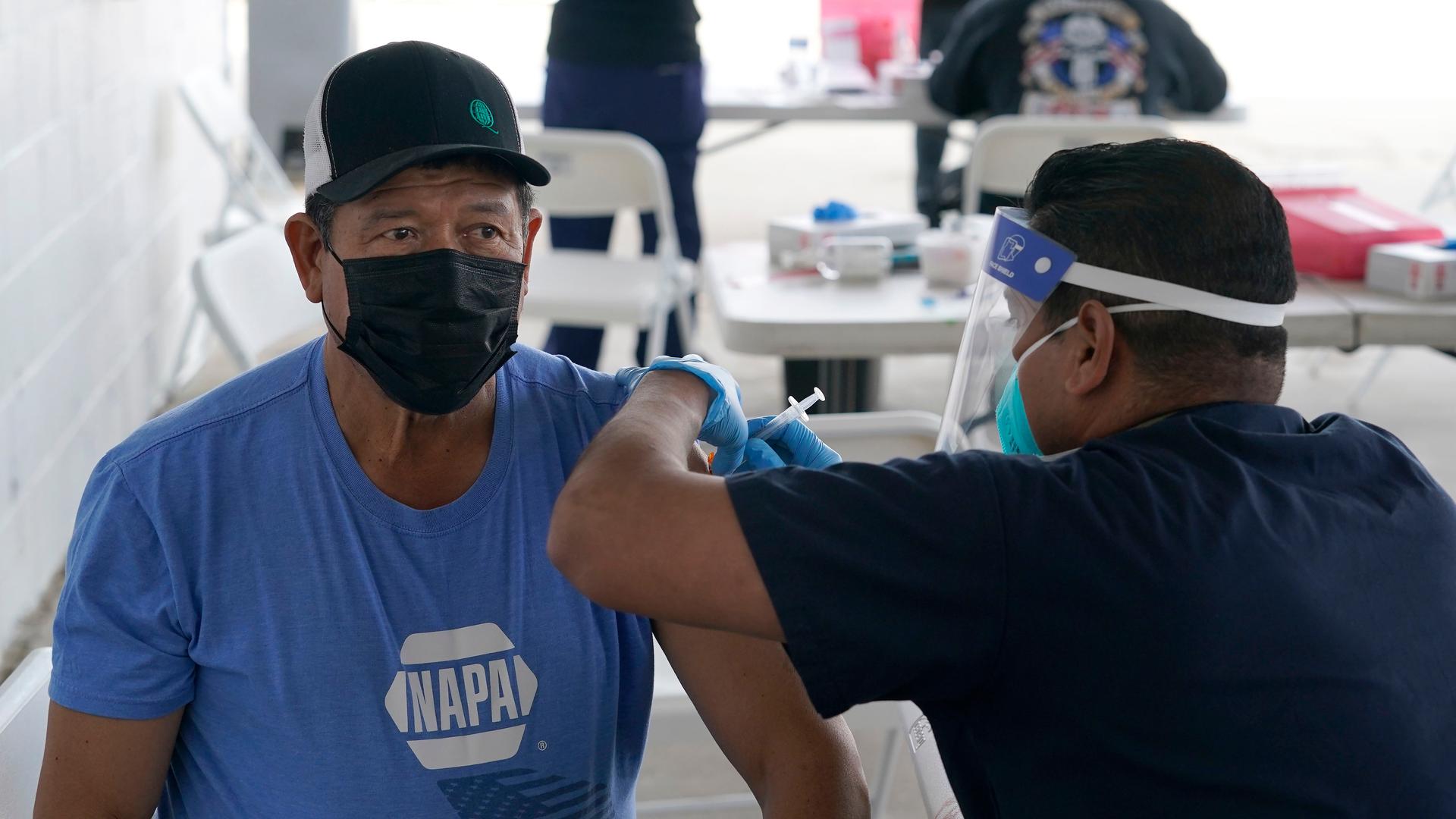As COVID-19 vaccine rollouts continue across the US, grassroots organizations are fighting not only vaccine access inequities — but also misinformation and skepticism among immigrant groups and communities of color.
Luz Gallegos, executive director of TODEC Legal Center, an immigrant rights group, said the nonprofit has been engaging with the farmworker community to provide vaccine education in Southern California’s Inland Empire and Coachella Valley since last year.
Related: Farmworkers face retaliation for demanding safe conditions
They needed trusted messengers to dispel myths about the vaccine, Gallegos said. One of the most common myths she hears is that the vaccines have tracking chips, making it easier for immigration officials to follow them.
Organizations like TODEC face the same hurdles across the country. Immigrant communities are still dealing with former President Donald Trump’s negative immigration rhetoric. A large sector of farmworkers are undocumented and many fear getting tested, or getting health care, Gallegos said. “That hasn’t made it easy for immigrants to feel at home.”
Related: From ‘aliens’ to ‘noncitizens’ – a Biden word change that matters
Riverside County is the first in the country to put farmworkers next to other front-line essential workers regardless of age or other health concerns, making them eligible to get vaccinated in the state’s first phase of vaccination. TODEC helps by getting workers registered for the vaccine — and on mass vaccination days, where the clinics come to set up in the fields, volunteers offer translation services.
But the need to expand vaccination eligibility at this scale is urgent, many advocates say. More than 480,000 agricultural workers have tested positive for COVID-19 nationwide, according to a study from Purdue University. It’s unclear how many have died from the virus, but Gallegos said the death toll, from firsthand accounts, has overwhelmed these communities.
“We’re healing, we’re healing, but as a community we are very bruised.”
“We’re healing, we’re healing, but as a community, we are very bruised,” she said.
Two hours away from Riverside County, in Ventura County, farmworkers there have yet to qualify for vaccines. But community volunteers are turning to radio as another means to educate and engage with farmworkers around vaccine trust — especially among those who don’t speak English or Spanish.
Radio Indigena: Trusted voices
Radio Indígena, a radio station run by the Mixteco Indigena Community Organizing Project or MICOP, serves the area’s Indigenous migrant community, the majority who speak Mixteco, Triqui and Zapoteco. The station offers 40 hours of programming, including music and radio shows.
Alondra Mendoza and Juan Carlos Diaz host a weekly bilingual health segment, “Camino a la Salud,” or “Road to Health.” They’ve only been hosting for four months, and have very little radio experience, but they have already become trusted community voices.
Listeners call in or send their questions about the vaccine. In one recent segment, someone asks if it’s true that the vaccine causes infertility. Diaz answers in Mixteco, and Mendoza follows up in Spanish, pushing back with information from the county health department.
“We feel very confident about the information we share.”
Diaz said they spend their hours poring over legal resources and community aid postings that they’re able to pass along when questions come up.
“We feel very confident about the information we share,” he said.
Many of their listeners are afraid to go to county clinics to get tested, or get medical treatment if they fall sick with COVID-19, especially if they lack health insurance, Mendoza said, so their radio segment helps the community understand its available resources and reassures them that these are safe spaces for immigrants.
“We’ve heard from people who tune in because their friends tell them we will answer their health questions, so now we get more calls and questions.”
“We’ve heard from people who tune in because their friends tell them we will answer their health questions, so now we get more calls and questions,” Mendoza said.
Another host with the station, Lidia Perez, said people approach her to ask questions and share their concerns about the pandemic. Originally from the Mexican state of Oaxaca, Perez has worked in California fields for 20 years. Like Mendoza and Diaz, she’s a volunteer DJ with the organization.
As a farmworker, Perez mostly spoke Mixteco and said she knows what it’s like to feel alone working in the fields, especially if you don’t speak Spanish or English. Having shared experiences with her listeners makes it easier for her to connect with the community and build trust, Perez said.
“If I see them [community members], I say hello from a distance. … I tell them, don’t get discouraged, everything will be OK.”
“If I see them [community members], I say hello from a distance,” she said in Spanish, which she learned while working in the fields. “I tell them, don’t get discouraged, everything will be OK.”
Related: Amid wildfires, US farmworkers labor with few protections
Back in Riverside County, Gallegos with TODEC has just finished another long day helping get farmworkers vaccinated. She hopes the county’s vaccine campaign will be a model for other counties and states to follow — especially with ongoing vaccine inequities.
“And right now, it’s up to us as an organization to continue elevating the realities, elevating the challenges,” she said.
Despite the loss and pain the migrant farmworker community has faced this past year, Gallegos said — they’re resilient.
